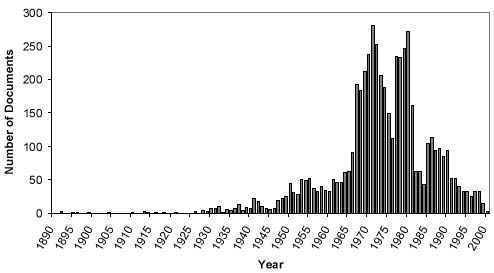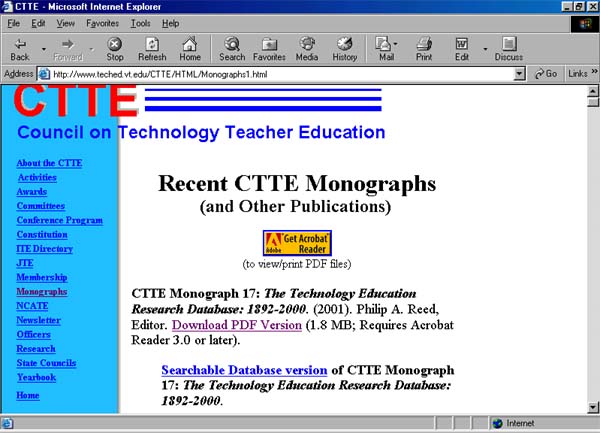JTE v13n2 - Research in Technology Education: Back to the Future
Research in Technology Education: Back to the Future
Philip A. Reed
The release of the Standards for Technological Literacy: Content for the Study of Technology ( International Technology Education Association, 2000 ) has spawned significant activity and literature addressing needed research in technology education. For example, the American Association for the Advancement of Science (AAAS) held a conference to look at what research would help to achieve the goal of technological literacy ( Cajas, 2000 ). More recently, the National Research Council ( 2002 ) released a framework outlining three areas of standards-based research for mathematics, science and technology education. The three areas of curriculum, teacher development, and assessment and accountability reflect previous standards work in mathematics and science as well as the third phase of the Technology for All Americans (TFAA) project.
The research vision of these projects and the data provided by the ITEA/TFAA Gallup Poll ( International Technology Education Association, 2002 ) give researchers clear lines of inquiry to further technology education's place within the context of general education. A new Council on Technology Teacher Education tool, the Technology Education Graduate Research Database (TEGRD), can also help with new lines of research. The TEGRD was specifically designed to highlight the history of research within technology education, provide a starting point for researchers, and to help scholars build upon past research as well as create diverse new research ( Reed, 2001 ). Reflection on these three goals point out that previous technology education studies can help researchers prepare for the future.
Figure 1 Technology Education Graduate Studies By Year ( Reed, 2001 ).

With over 5,260 theses and dissertations in the TEGRD, spanning the years from 1892-2000, the history of graduate research in technology education is clearly highlighted. In illustrating this, however, Figure 1 shows that the total amount of research is not so important as its consistency over time. To demonstrate this point, consider the steady decline in graduate research after the name change from industrial arts to technology education (1985-2000). This is a disturbing trend during a period when inquiry to support the transition to technology education would have seemingly been substantial. Clearly this indicates that either there were fewer graduate programs requiring research and/or there were fewer graduate students pursuing advanced degrees.
For those graduate students who are conducting research, the TEGRD is an excellent starting point. Since entries in the TEGRD are based on the work of Jelden ( 1981 ), Foster ( 1992 ) and Reed ( 2001 ), they are more focused on technology education than other databases. For example, searching the terms "module" or "modular" in Dissertation Abstracts Online will yield many more returns dealing with nursing education and military instruction than returns pertinent to technology education. Searching the same terms in the TEGRD yields nineteen returns. This scenario is not meant in any way to downplay the importance of a broad-based literature review process. On the contrary, it is hoped that the TEGRD will be used as an additional tool to make literature reviews more robust. For instance, using the "module/modular" search example, a researcher should be able to make a more accurate connection to programmed instruction, self-training, and other behavioral systems that influenced the development of modular technology education.
A second look at Figure 1 shows the level of graduate research occurring between 1967 and 1981. Reviewing the history from this timeframe can help build upon past research and create diverse new research. For example, Cochran ( 1970 ) and Householder ( 1972 ) provided reviews of the vast number of curriculum development projects during the 1960's. Many of these projects were the result of federal funds provided by the 1958 National Defense Education Act, the 1963 Vocational Education Act, or private grants from organizations such as the Ford Foundation. Although these curriculum projects were developmental, several such as the Industrial Arts Curriculum Project were the catalyst for meaningful research. It is not difficult to draw parallels between this past pattern and the current state of technology education. The Technology for All Americans Project and the activities mentioned above have provided a significant foundation for researchers. Plus, federal funding is increasingly available to technology education researchers through the National Science Foundation (NSF) ( Custer, Loepp, and Martin, 2000 ).
The call for a research base on technological literacy is also well documented ( National Academy of Engineering and National Research Council, 2002 ). The TEGRD highlights the fact that there is a research base for technology education even though it is not solely focused on technological literacy. Naysayers may claim this is simply a disjointed compilation of studies. However, the key point is that technology education does have a historical foundation on which to build new studies. Figure 2 illustrates how to access the TEGRD both in print and as an online searchable database from the Council on Technology Teacher Education website ( ). This tool will only be valuable if it is accessed and built upon. Looking back to the future, technology educators should be proud of the research they have conducted and the extent to which the profession continues to use it to forge ahead.
Figure 2 Accessing the TEGRD via the World Wide Web ( Council on Technology Teacher Education, 2002 ).

Author
Philip A. Reed ( reedp@brevard.k12.fl.us ) is a Resource Teacher for the Industrial and Technology Education Programs in Brevard County, Florida.
References
Cajas , F. (2000). Technology education research: Potential directions. Journal of Technology Education , 12(1) .
Cochran , L. (1970). Innovative programs in industrial education . Bloomington, IL: McKnight & McKnight.
Council on Technology Teacher Education. (2002). Recent CTTE Monographs and other publications . [Online] Available: http://www.teched.vt.edu/CTTE
Custer , R., Loepp, F., and Martin, G. E. (2000). NSF funded projects: Perspectives of project leaders. Journal of Technology Education , 12(1) .
Foster , T. W. (Editor). (1992). Electronic supplement #1 to the Journal of Technology Education: A partial bibliography of recent graduate research in technology education and related fields . [Online] Available: http://scholar.lib.vt.edu/ejournals/JTE/ .
Householder , D. L. (1972). Review and evaluation of curriculum development in industrial arts education . Columbus, OH: Eric Clearinghouse on Vocational and Technical Education
International Technology Education Association. (2002). ITEA/Gallup Poll reveals what Americans think about technology. The Technology Teacher , 61(6).
International Technology Education Association. (2000). Standards for technological literacy: Content for the study of technology . Reston, VA: The Author.
Jelden , D. L. (Editor). (1981). Summaries of studies in industrial arts, trade and industrial, and technical education . Greeley, CO: University of Northern Colorado.
National Academy of Engineering and National Research Council. (2002). Technically speaking: Why all Americans need to know more about technology . Greg Pearson and A. Thomas Young, (Eds.), Committee on Technological Literacy. Washington, DC: National Academy Press.
National Research Council. (2002). Investigating the influence of standards: A framework for research in Mathematics, Science, and Technology education . I. R. Weiss, M. S. Knapp, K. S. Hollweg, and G. Burrill (Eds.), Committee on Understanding the Influence of Standards in K-12 Science, Mathematics, and Technology Education, Center for Education, Division of Behavioral and Social Sciences and Education. Washington, DC: National Academy Press.
Reed , P. A. (Editor). (2001). Monograph #17: The technology education graduate research database: 1892-2000 . Reston, VA: Council on Technology Teacher Education